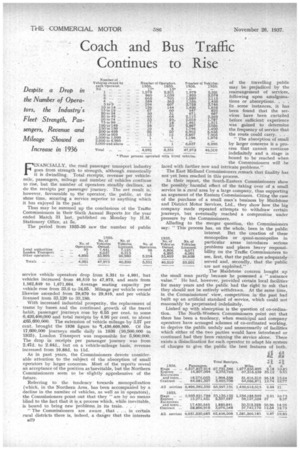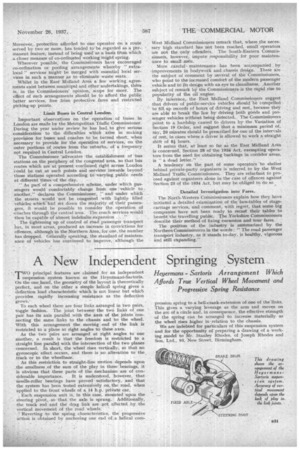Coach and Bus Traffic Continues to Rise
Page 14

Page 15

If you've noticed an error in this article please click here to report it so we can fix it.
Despite a Drop in the Number of Operators, the Industry's Fleet Strength, Passengers, Revenue and Mileage Showed an
Increase in 1936 FINANCIALLY, the road passenger transport industry goes from strength to strength, although numerically it is dwindling. Total receipts, revenue per vehiclemile, passengers, mileage and number of vehicles continue to rise, but the number of operators steadily declines, as do the receipts per passenger journey. The net result is, however, favourable to the operator, the public, at the same time, securing a service superior to anything which it has enjoyed in the past.
Thus may be summed up the conclusions of the Traffic Commissioners in their -Sixth Annual Reports for the year
ended March 31 last, published on Monday by H.M. , Stationery Office, at 5s.
The period from 1935-36 saw the number of public service vehicle operators drop from 5,351 to 4,991, but vehicles increased from 46,510 to 47,973, and seats from 1,562.849 to 1,671,664. Average seating capacity per vehicle rose from 33.6 to 34.85. Mileage per vehicle owned likewise ascended from 29,670 to 29,910, and per vehicle licensed from 33,120 to 33,180.
With increased industrial prosperity, the replacement of trams by buses and the continued growth of the travel habit, passenger journeys rose by 6.55 per cent, to some 6,426,400,000 and total receipts by 4.98 per cent, to about £.65,600,000. The extension of vehicle mileage by 3.57 per cent, brought the 1936 figure to '1,430,600,000. Of the 17,600,000 journeys ma-de daily in 1936 (16,500,000 in 1935), London Transport was responsible for 5,900,000. The drop in receipts per passenger journey was from 2.47d. to 2.44d., but on a vehicle-mileage basis, revenue increased from 10.85d. to 11d.
As in past years, the Commissioners devote considerable attention to the subject of the absorption •of small operators by larger concerns. Most of the reportsreveal an acceptance of the position as inevitable, but the Northern Commissioners seem to be slightly apprehensive of the future.
Referring to the tendency towards monopolization (which, in the Northern Area, has been accompanied by a decline in the number of vehicles, as well as in operators), the Commissioners -point out that they "are by no mean's blind to the fact that it is a process which, while inevitable, is bound to bring new problems in its train. . .
"The Commissioners are aware that . . . in certain rural districts there is, indeed, a danger that the interests u:119 of the travelling public may be prejudiced by the rearrangement of services. following upon amalgama
tions or absorptions. . . In some instances, it has been found that the services have been curtailed before sufficient experience was gained to determine the frequency of service that the route could carry. .
1,196 1,076 1
1 6;5-37 6,295
5,351 47,973 46,510
"The absorption of small by larger concerns is a process that cannot continue indefinitely and a stage is hound to be reached when the Commissioners will be faced with further new and intricate problems." The East Midland Commissioners remark that finality has not yet been rearhed in this process.
In their report, the South-Eastern Commissioners show the possibly • harmful effect of the taking over of a small service in a. rural area by a large company, thus supporting an argument of the Eastern Commissioners. Citing the case of the purchase of a small man's business by Maidstone and District Motor Services, Ltd., they show how the big company made repeated attempts to withdraw certain journeys, but eventually reached a compromise under pressure by the Commissioners.
Alluding to the merger question, th-.1 Commissioners say: "This process has, on the whole, been in the public interest. But the creation of these
1935. monopolies or .quasi-monopolies in No. of No. of particular areas introduces serious
Vehicles Vehicles
0wned6,8.06. Licensed, problems and places heavy responsi 6,m5 6,octs bility on the Traffic Commissioners to 53,409 266:19 see, first, that the public are adequately
served and, secondly, that the public are not exploited."
The Maidstone concern bought up the small man partly because he possessed a " nuisance value." He had, however, provided certain local facilities for many years and the public had the right to ask that they should not be entirely withdrawn. At the same time, in the Commissioners' view, competition in the past had built up an artificial standard of service, which could not reasonably be perpetuated indefinitely.
Linked up with absorption is the question of co-ordination. The North-Western Commissioners point out that there has been a tendency, when municipal and company operators have arranged schemes of co-ordinated working, to deprive the public unduly and unnecessarily of facilities which either of the two parties would have introduced or continued had they been running the service alone. There exists a disinclination for eachoperator to adapt his system of charges to give the public the best features of both. Moreover, protection afforded to one operator on a route served by two or more, has tended to be regarded as a permanent feature, instead of being used as a basis from which .a.cleser measure of co-ordinated working might spring. .
Wherever possible, the Commissioners have encouraged eo-ordination or pooling arrangements whereby " extralocal " services mightbe merged with essential local services in such a manner as to 'eliminate waste seats.
• Whilst in the East Midland Area a few working agreements exist between municipal and other undertakings, there is-, in the Commissioners' opinion, scope for more. The effect of Such arrangements should be to afford the public • better services, free from protective fares and restricted picking-up points.
Limit Buses in Central London.
Important observations on the operation of buSes. in London are made by the Metropolitan Tiaffic Commissioner. .During the year under review . he has had. to give serious consideration to the difficulties which .. arise in making provision for buses and coaches to be. turned short,. when necessary to provide for the operation of services, on the outer portions of routes from the suburbs, • of 'a frequency not required in Central London.
The Commissioner -advocates the establishment of stations on the periphery of the congested 'area, so that bits routes which are at present continued right across London • Could be cut. at such points and services inwards beyond . those stations orierated according to varying public needs at different times -of the day.
" As part of a comprehensive scheme, under which passengers would comfortably change frorn one vehicle to: another," declares the Commissioner, " and under which .. the streets would not be congested with lightlyfilled vehicles which' hadset down the majority of their passengers, ft would be possible to consider the operation of -Coaches through the central area. The coach services-would then be capable of -almost indefinite expansion • " The tightening up of control of road passenger transport bas, in most areas, produced an increase in convictions for offences, although in the Northern Area, for one, the number has dropped. Generally speaking, the standard of maintenance of vehicles has continued to improve, although the
West Midland Commissioners remark that, where the necessary high standard has not been reached, small operators are not the only offenders. The South-Eastern Conunissioners, however, impute responsibility for poor maintenance to small-men.
• More .carefulmaintenance has been accompanied. by -improvements in bodywork and _chassis design. These are the subject of •oomment by several of the Commissioners, who point to the increased comfort of the modern passenger vehicle and to its design with an eye to cleanliness. _Another subject of remark 1)); the Commissioners-is the rapid rise to popularity of the oil .engine.
By inference,. the East Midland Commissioners suggest that drivers of public-service yehicies should be comPelled to-.fill.Up records of hours of driving and rest, because they are able to break the kW by driving both goods and passenger vehicles without being detected. The Commissioners point to a _hardship caused to drivers bythe Variation of Section 19 Order, and suggest that a minimum period of, say, 20 minutes should he prescribed for one of the intervals of rest, in cases where a driver is allowed to work a straight shift of Si hours. -_
It seems that, at least so far as the East Midland Area is concerned, Section 28 of the 1934 Act, exempting operators from the need for obtaining backings in corridor areas, is " a dead letter.'' A tendency on the part of some operators to shelter behind private-party organizers is referred to by the West Midland Traffic Commissioners. They. are reluctant to proCeed against organizers alone in the case of offences against Section 25 of the 1934 Act, but may be obliged to do so Detailed Investigation into Fares.
The North-Western Commissioners explain how they have initiated a detailed eXamination of the 'fare-tables of stagecarriage services, and comment, with regret, that some big companies have not been ready to recast their tables to benefit the travelling public. The Yorkshire Commissioners describe their method of fixing excursion and tour fares.
The position of the industry is summarized by the Northern Commissioners in the words : "The road passenger transport industry, as it stands, to-day, is healthy, vigorous and still ekpanding."






























